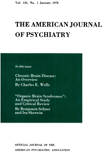Abstract
On the basis of our findings we consider that the manic excitements, the depressions and the anxiety states are related in terms of the degree of facilitation and inhibition which is present. In all three the total tensional level is raised but in the excitements facilitation is maximal and inhibition is greatly reduced, though still present. In the depressions inhibition is present with facilitation greatly reduced. In the anxiety states there is an increase in both facilitation and inhibition, the two, as it were, competing against each other and being responsible for the characteristic picture of curbed overactivity.
On this basis it is possible to recognize a range of reactions—predominant facilitation (manic excitements), facilitated anxiety states, inhibitory anxiety states and predominantly inhibitory states (depressions).
The advantages inherent in this series of concepts which we have set up are first that they offer an explanation of the difficulty which initiated the investigations, namely that of differentiating between depressions and anxiety states. For it is clear that save where inhibition is outstandingly dominant and where facilitation is minimal some anxiety symptoms may be anticipated in the depressive reaction and similarly some depressive features are to be seen in all anxiety states, save where inhibition plays an entirely secondary rôle to facilitation.
Second they tend to break up the old pathological pictures of manic depressive and anxiety conditions and to restate them in terms of reactions which occur in everyday life so that it is possible to see these conditions essentially as constituting intensifications of activities normally present in the individual.
Third they afford some insight into the fact that the total reaction of the organism is most intense as demonstrated, for example, by the biochemical findings in the anxiety states where facilitation and inhibition are in sharp conflict as contrasted with the depressions and excitements where one or other has acquired dominance.
Fifth these concepts offer new vistas on possible therapies. In stating this it is necessary to bear in mind that a therapy to be successful does not necessarily have to deal with the primary cause but needs only to be capable of interrupting in a constructive manner an undesirable train of events (Cameron, 1944, a, b). Therapies of excitement, depression and anxiety, based upon the modification of inhibition and facilitation, have already acquired some measure of success. It would seem that continued inquiry into the development of more effective means of controlling these states would be fruitful.

